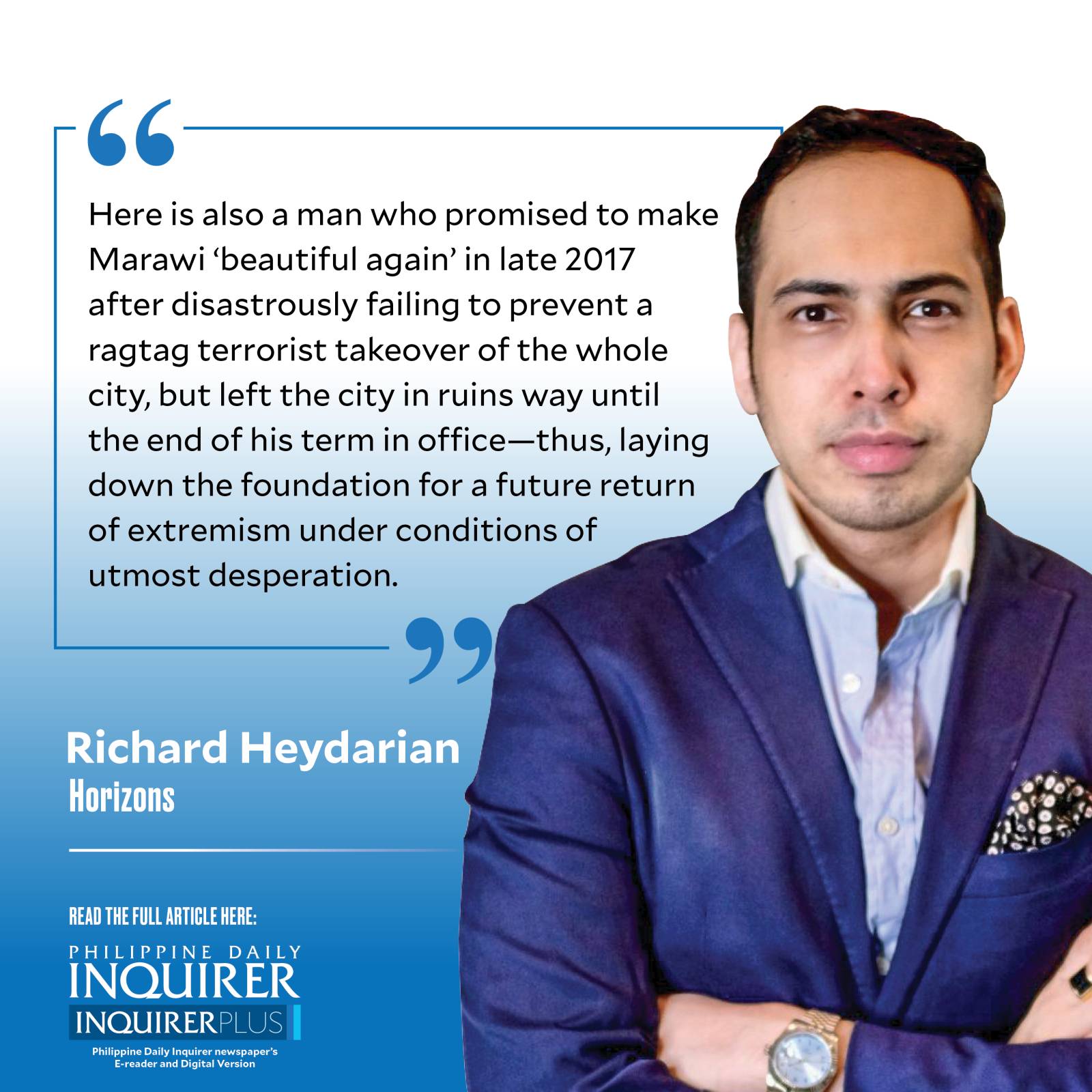The trial of Rodrigo Duterte

Henry Kissinger recently passed away just months after turning 100. Earlier this year, I had the opportunity to exchange views with him along with a select group of Asian thought leaders. Overall, I found him incredibly engaged and intellectually inquisitive.
By all measures, he was one of the most consequential figures of the past century. Born in Bavaria as Heinz Alfred Kissinger to a Jewish family, he grew up under the shadow of the Nazi regime. To avert an impending doom, his family eventually moved to New York City.
At least 13 of his close relatives, however, fell victim to the Holocaust. At the age of 22, Kissinger would return to his country of birth as part of a liberating force. But this was also when he confronted “one of the most horrifying experiences of [his] life.” While serving in the American 84th Infantry Division as an army sergeant, he encountered the survivors of a Nazi concentration camp in Ahlem.
Article continues after this advertisementThere, a horrified Kissinger witnessed “the empty faces, the dead eyes” of those who managed to just cling to life after years of inexplicable suffering. Over the next quarter-century, Kissinger worked his way up the American imperial bureaucracy.
Intellectually, he was driven by the experience of post-Napoleonic Europe, when a coterie of shrewd and pragmatic diplomats—most notably Viscount Castlereagh and Metternich—engineered a new, relatively stable order for almost half a century in one of the world’s most war-stricken continents.
Though fashioning himself as a paragon of realpolitik, the reality was that Kissinger was fundamentally an idealist, albeit a tragic one. He was a man who believed that America had a special mission in the world built on the ashes of World War II.
Article continues after this advertisementAs the Nixon administration’s chief diplomat, he effectively invented “shuttle diplomacy,” when in the course of five weeks he negotiated peace between Israel and leading Arab neighbors in the mid-1970s. At the same time, he also negotiated the foundations of a long-lasting détente between the United States and China, which would transform the world for the next half-century.
He eventually won a Nobel Peace Prize for his diplomatic work, but his legacy was far from uncontroversial. In one of his most influential works, the legendary writer Christopher Hitchens laid down the ground for the possible prosecution of Kissinger for alleged war crimes—most notoriously America’s support for the violent overthrow of a progressive regime in Chile and carpet-bombing of Cambodia, which claimed the lives of at least 150,000 civilians.
“Kissinger symbolizes the pornography of power,” Hitchens wrote in his literary indictment of the legendary diplomat for “deliberate mass killings of civilian populations in Indochina, collusion in mass murder and assassination in Bangladesh, the personal planning of the murder of General Schneider in Chile, involvement in a plan to murder Archbishop Makarios in Cyprus and the incitement and enabling of genocide in East Timor.” Thus, Hitchens argued, “[i]n the name of innumerable victims, it is time for justice to take a hand.”
Kissinger’s last hurrah was a visit to Beijing as a special guest of President Xi Jinping. Just days earlier, guess who was also in town to pay his respects to old patrons in China? Unlike Hitchens’ Kissinger, former Philippine president Rodrigo Duterte may eventually have his day in court, or, rather, courts! After all, here is a man who was not only subpoenaed by a Manila court for publicly threatening a current member of the House of Representatives but may also face an investigation by the International Criminal Court (ICC) on allegations of mass atrocities.
As trauma reporter Patricia Evangelista methodically exposes in “Some People Need Killing,” the longtime Davao mayor’s human rights record is singularly atrocious, with few parallels in the post-colonial world. But here is also a man, who was atrociously subservient to a foreign bully, when our fishermen faced violence and death in the West Philippine Sea.
Here is also a man who promised to make Marawi “beautiful again” in late 2017 after disastrously failing to prevent a ragtag terrorist takeover of the whole city, but left the city in ruins way until the end of his term in office—thus, laying down the foundation for a future return of extremism under conditions of utmost desperation. Notwithstanding his cult-like popularity, justice may finally catch up with the Philippines’ most notorious, if not most incompetent, president.
rheydarian@inquirer.com.ph
















